|
|
|
Sort Order |
|
|
|
Items / Page
|
|
|
|
|
|
|
| Srl | Item |
| 1 |
ID:
141074


|
|
|
|
|
| Summary/Abstract |
With reference to original ethnographic and historical research on India, the papers collected in this forum suggest conceptual refinements that might re-centre the study of class in regional scholarship. Through discussions of class politics in industrial, construction and agricultural contexts, the authors interrogate the conceptual oppositions between stably employed fordist labour forces and the ‘working poor’ that have often constrained ethnographic and historical analyses of India's working classes. Inspired by Marxist historiography, this forum engages with the historically contingent emergence of Indian working classes through different types of labour, gender and ethnic struggles, and considers the complex political boundaries that are produced by such processes.
|
|
|
|
|
|
|
|
|
|
|
|
|
|
|
|
| 2 |
ID:
131907
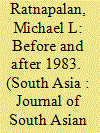

|
|
|
|
|
| Publication |
2014.
|
| Summary/Abstract |
This paper discusses the material effects of the theorisation of the contemporary Sri Lankan Tamil diaspora around the 1983 Colombo riots. In the complicated aftermath of the end of the Sri Lankan civil war in 2009, it is necessary to rethink the way in which diasporic history has been constructed in order to factor in its multiple dimensions and underlying dynamics. By critically foregrounding the key literature on the Sri Lankan Tamil diaspora, which is definitive to understanding the history of Sri Lankan Tamil emigration around the 1983 riots, the modern diaspora can be framed anew by longer and more diverse historical perspectives.
|
|
|
|
|
|
|
|
|
|
|
|
|
|
|
|
| 3 |
ID:
127148


|
|
|
| 4 |
ID:
115248
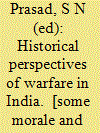

|
|
|
|
|
| Publication |
New Delhi, Centre for Studies in Civilizations, 2002.
|
| Description |
xxx, 437p.
|
| Series |
Project of History of Indian Science, Philosophy and Culture
|
| Contents |
Vol. X
|
| Standard Number |
8187586109
|
|
|
|
|
|
|
|
|
|
|
|
Copies: C:1/I:0,R:0,Q:0
Circulation
| Accession# | Call# | Current Location | Status | Policy | Location |
| 056917 | 355.00954/PRA 056917 | Main | On Shelf | General | |
|
|
|
|
| 5 |
ID:
143937
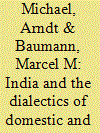

|
|
|
|
|
| Summary/Abstract |
International land “acquisition” or land “grabbing” has become a global phenomenon in which India plays an increasingly important role. While there is a critical domestic debate regarding land deals within India — especially pertaining to the provisions of the Land Acquisition Act of 2014 — there is practically no such debate regarding international land deals by Indian companies in Sub-Saharan Africa. By applying a two-level discourse analysis, this article argues that the land discourse within India can be understood as a strategy of exclusion. By linking land issues with questions of “development,” the discursive strategies of powerful actors lead to the exclusion of the arguments of NGOs and others opposed to the land deals from the discourse within India. This strategy of exclusion is then taken to the extreme with the strategy of securitization outside India: land deals are linked to “food security,” as the example of Ethiopia highlights.
|
|
|
|
|
|
|
|
|
|
|
|
|
|
|
|
| 6 |
ID:
168188
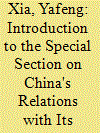

|
|
|
|
|
| Summary/Abstract |
This edition of Asian Perspective features a special section on China's relations with its neighbors, following a full special issue on the topic (Asian Perspective, vol. 42, no. 4, 2018). This special section comprises three articles that offer a historical lens on China's contemporary relations with India, Burma, and Sri Lanka, respectively. Making use of archival documentation from the Chinese Foreign Ministry archives and the Jawaharlal Nehru Memorial Museum and Library, Chaowu Dai explores the evolution of China's policy toward Sino-Indian border disputes. Dai argues that the People's Republic of China (PRC) attempted to peacefully resolve its border disputes with neighboring countries through negotiations. According to Dai, the PRC adopted this approach in resolving its border disputes with Burma, Nepal, and Pakistan prior to the Sino-Indian border clashes in 1959. He thus challenges the view of Indian and Western scholars that China was pursuing territorial expansion.
|
|
|
|
|
|
|
|
|
|
|
|
|
|
|
|
| 7 |
ID:
128619
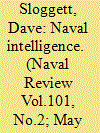

|
|
|
|
|
| Publication |
2013.
|
| Summary/Abstract |
The author argues, through historical examples, that naval intelligence need to undergo a sea change to meet its likely foreseeable roles in the 21st century.
|
|
|
|
|
|
|
|
|
|
|
|
|
|
|
|
| 8 |
ID:
132556
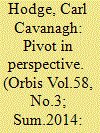

|
|
|
|
|
| Publication |
2014.
|
| Summary/Abstract |
The article examines the reorientation of the defense policy of the United States, initiated during the Bush and Obama Administrations, toward giving increased priority to the Asia Pacific region. It begins with the historical perspective of the development of American naval power in the twentieth century. The world wars, in which Europe represented the primary theater of conflict, had the effect of shifting a greater share of American military assets toward the Euro-Atlantic theatre, while the onset of the Cold War after 1945 required the United States to develop a navy of truly global strategic reach in which Atlantic and Pacific commitments were kept in balance. With the diminished concern for European security since the end of the Cold War and the emergence of the People's Republic of China as a Strategic Competitor in the Asia Pacific region, the United States is required in an age of defense austerity to refocus attention again to the Pacific.
|
|
|
|
|
|
|
|
|
|
|
|
|
|
|
|
|
|
|
|
|